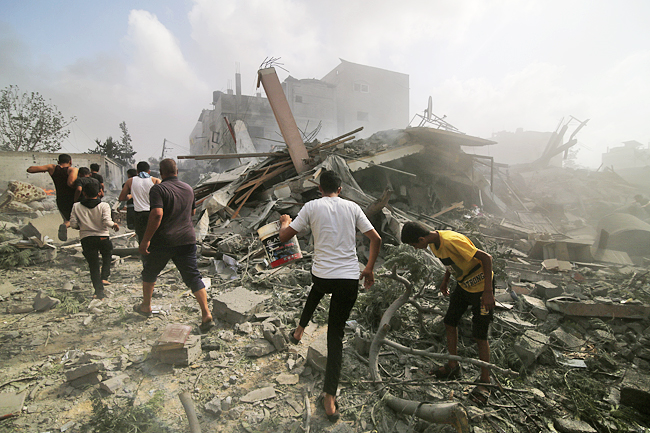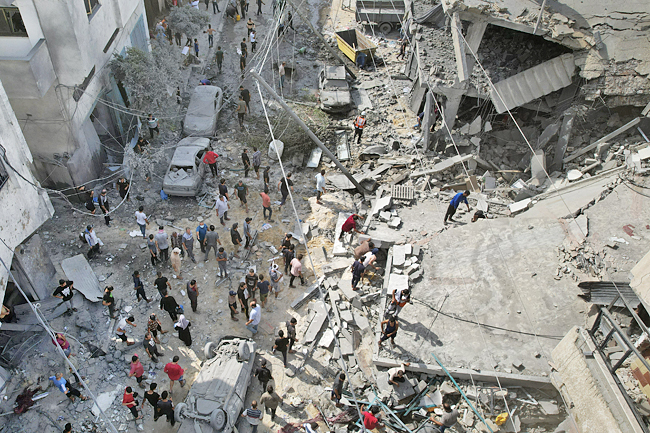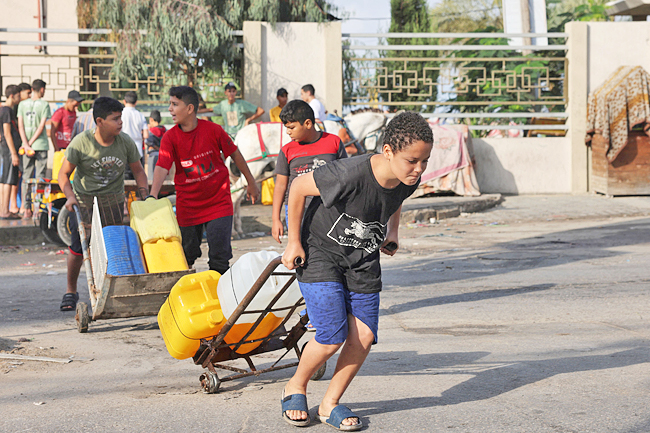RAFAH (AP) – Israeli warplanes struck targets across Gaza overnight and into yesterday, as well as two airports in Syria and a mosque in the occupied West Bank allegedly used by militants, as the two-week-old war with Hamas threatened to spiral into a broader conflict.
Israel has traded fire with Lebanon’s Hezbollah group on a near-daily basis since the war began, and tensions are soaring in the Israeli-occupied West Bank, where Israeli forces have battled in refugee camps and carried out two airstrikes in recent days.
For days, Israel has seemed to be on the verge of launching a ground offensive in Gaza. Tanks and tens of thousands of troops have massed at the border, and Israeli leaders have spoken of an undefined next stage in operations.
A convoy of 17 aid trucks was allowed to enter Gaza from Egypt yesterday, Egypt’s state-run media reported, the second shipment into the territory since Israel imposed a complete siege two weeks ago. On Saturday, 20 trucks entered.
Relief workers said far more was needed to address the spiraling humanitarian crisis in Gaza, where half the territory’s 2.3 million people have fled their homes. The United Nations (UN) humanitarian agency, known as OCHA, said Saturday’s convoy carried about four per cent of an average day’s imports before the war and “a fraction of what is needed after 13 days of complete siege”.



Hospitals packed with patients and displaced people are running low on medical supplies and fuel for generators, forcing doctors to perform surgeries with sewing needles, using vinegar as disinfectant, and without anaesthesia.
The World Health Organization said at least 130 premature babies are at “grave risk” because of a shortage of generator fuel. It said seven hospitals in northern Gaza have been forced to shut down due to damage from strikes, lack of power and supplies, or Israeli evacuation orders.
Shortages in critical supplies, including ventilators, are forcing doctors to ration treatment, said Dr Mohammed Qandeel, who works in Khan Younis’ Nasser Hospital.
Dozens of patients continue to arrive and are treated in crowded, darkened corridors, as hospitals preserve electricity for intensive care units.
Palestinians sheltering in UN-run schools and tent camps are running low on food and drinking dirty water. A power blackout has crippled water and sanitation systems. OCHA said cases of chicken pox, scabies and diarrhea are on the rise because of the lack of clean water.
Heavy airstrikes were reported across Gaza, including in the southern part of the coastal strip, where Israel has told civilians to seek refuge. At the Al-Aqsa hospital in Deir al-Balah, south of the evacuation line, several bodies wrapped in white shrouds were lined up outside on the ground.



